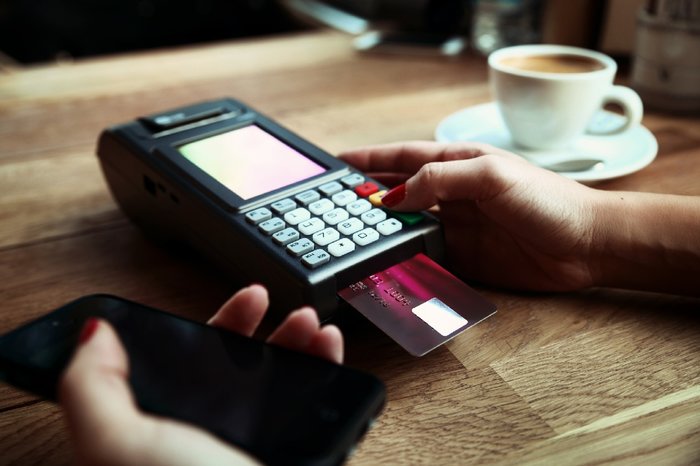Is credit card processing secure?
As a small business owner, you must remain vigilant against credit card fraud. Though most headlines focus on data breaches at major retail chains, small businesses are vulnerable too. Small businesses can shore up their credit card processing security measures by doing two things.
The first step is to ensure that you comply with the Payment Card Industry Data Security Standard (PCI DSS). Created by Visa, Mastercard, American Express, Discover and JCB in 2006, this standard requires that businesses meet certain criteria to ensure their transactions are as secure as they can be.
The second action is to upgrade your card reader to accept EMV (Europay, Mastercard and Visa) chip cards. Most credit cards have a chip embedded in one end of the card, and having the technology to read that chip makes the transaction significantly more secure because the chip is harder to counterfeit than the standard magnetic strip.
How can you avoid credit card processing fees?
Credit card processing companies rely on fees to make their money, so there’s no way to completely eliminate credit card processing fees. If you feel you’re paying too much in fees, you can negotiate with credit card processors to reduce them. If you can accept cards in person instead of over the phone or online, you’ll also save money on fees.
Another option is to set a minimum transaction amount that customers must meet before they can pay with a credit card. By doing this, you can ensure you come out on top of the transaction, since it makes more financial sense to pay the fee on a $10 purchase than on a $2 one. Major credit card networks have rules about minimum transaction amounts, so verify that your policy complies with their rules.
Similarly, you can move the fee to your customers entirely by using cash discounts or surcharging. Many gas stations use this method, in which a gallon of gas is discounted if you pay with cash. Though this may cause potential customers to take their business elsewhere, it could encourage people who prefer paying with cash to frequent your store more often. If you go this route, check the credit card networks’ rules for surcharging to ensure you follow best practices.
How much are credit card processing fees for consumers?
Consumers usually don’t pay credit card processing fees. Some processors advertise surcharging programs that pass processing fees to your customers. However, these programs aren’t popular with consumers and thus could be risky.
Before you implement such a program, make sure you understand your customers and determine if they would accept it or if it would lead them to shop elsewhere. As mentioned above, the credit card networks have surcharge rules.
How long can a merchant hold an authorization?
Authorization holds vary depending on the status of the transaction and the card issuer’s self-imposed time limits. For most transactions, a merchant has up to 30 days to clear an authorization hold, though some credit card companies, like Visa and Discover, have significantly shorter time limits before such authorizations “fall off” the account. If you fail to complete a transaction hold, you run the risk of the credit card processing company charging you a misuse fee.
What are the typical credit card processing fees?
Credit card processors charge a variety of fees. Some are etched in stone; others are negotiable. One nonnegotiable charge is the interchange fee, which card-issuing banks charge on every transaction made with their credit cards. That fee is passed on to the merchant. The amount charged is based on the type of credit card the customer uses, whether the transaction is in person or online, and the amount of the purchase. The riskier the payment method, the more you pay in interchange fees.
The assessment fee or service fee is another nonnegotiable cost. Payment processors must pay this fee to the card networks, and they pass that fee on to the merchant.
The payment processor’s markup is the fee the payment processor charges to use its services. You may be able to negotiate this fee with some credit card processing companies.
What should I look for in a credit card processor?
When you’re looking for a credit card processor that is right for you and your business, consider the fees the processor charges, the terms of the contract, and the service it provides. You don’t want to be stuck with a payment processor that doesn’t have live customer support or is impossible to reach when you have a problem. You also want one that will work with you to ensure you remain PCI compliant, that offers EMV-supported card readers, and that accepts multiple payment methods.
What pricing structures are available for credit card processing?
There are three main credit card processing pricing models: tiered, interchange plus and flat rate. With tiered pricing, the credit card processor charges you the interchange rate, an assessment fee and its markup in different tiers. There are usually three tiers, but some vendors have up to six. The rates depend on the transaction type and credit card used. It’s difficult to compare the costs of vendors with tiered pricing.
Interchange-plus pricing is a structure in which credit card processors charge you the interchange rate, the assessment fees and their markup. You know exactly how much you are paying for the transaction, since the markup stays the same regardless of the type of card or transaction.
With a flat-rate pricing model, the vendor charges you a fixed percentage of each sale regardless of whether the customer is using a Visa, Mastercard or any other credit card. There could also be a per-transaction fee that depends on whether the transaction was an in-person or card-not-present payment.
How long does it take to settle credit card sales?
It typically takes 24 hours to three days to settle a credit card sale. The length of time depends on the merchant account provider and the type of merchant account you have. Thanks to advances in payment technology, the turnaround to clear credit card sales is faster than it used to be. If you choose a direct processor, like Chase — which is a combined processor and acquiring bank — you can expect shorter time frames.
Does online credit card processing work the same as in-store processing?
In-store and online credit card processing work the same way. The only difference is that, with online credit card processing, the consumer doesn’t swipe or insert a credit card. Instead, the customer inputs their credit card information while checking out online. This information typically includes the card number, the expiration date, the CVV number and the shopper’s billing address. Most credit card processors support both in-person and online payments. The latter is becoming more important as e-commerce and mobile commerce grow in popularity.
Should I avoid tiered credit card processor pricing?
Most small businesses should avoid tiered credit card processor pricing, which bundles the interchange rate, assessment fees and markup into one pricing plan. Because the costs are bundled, it’s difficult to tell how much you are paying for each item. Bundling also makes it hard to compare shops. Unless the vendor is willing to break out its fees, it’s best to avoid a tiered pricing structure.
Do people pay with cryptocurrency?
Approximately 18% of the U.S. adult population has invested in, traded or used cryptocurrencies, according to eMarketer. Credit card companies such as Visa and Mastercard are getting involved, making it easier for small business merchants to accept bitcoin and other cryptocurrencies via credit card. Future growth in cryptocurrency remains highly speculative, and there is no guarantee that it will retain its value. That said, accepting cryptocurrency as payment could serve as a way for small businesses to distinguish themselves from competitors and gain public attention.
What are the steps involved in credit card processing?
The steps in credit card processing are the same for most product categories and business types. The process starts with the customer selecting an item to purchase. The credit card is then swiped, scanned or entered into a payment terminal. Next, the data is transmitted to be approved. Once it goes through the authorization, which happens in seconds, the transaction will either go through or be declined. If there are enough funds, the transaction is authorized and completed. The merchant closes out all of the credit card transactions at the end of the day, and the credit card processor’s acquiring bank collects the money from the credit card issuers. The sales are then deposited into the merchant’s bank account, typically in two days or less.
Why do credit card processors offer high-risk merchant accounts?
Not all credit card processors work with every business. Industries that are prone to fraud and chargebacks may have a tougher time finding a company to process their sales. Some credit card processors work with high-risk businesses, but they charge more for their services, to mitigate some of the risk. They call their accounts high-risk merchant accounts and charge you more in processing and chargeback fees.
Which businesses do credit card processors consider high risk?
Tobacco and gambling are often perceived as high-risk businesses by credit card processors. Other industries a credit card processor may not work with include pawn shops, subscription services, alcohol sales and firearm dealers.
Read the full article here










